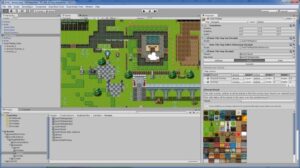Online game development tools have revolutionized the way we create and design games, making the process more accessible and engaging for developers of all skill levels.
From defining essential features and popular platforms to exploring the pros and cons, this discussion delves deep into the world of game development tools available online, providing insights into various game genres and the best practices for their effective use.
Overview of Online Game Development Tools

Online game development has evolved significantly, allowing developers to create engaging experiences without the need for extensive programming knowledge. Online game development tools are designed to simplify the process, making it accessible to both novice and experienced developers. These platforms enable users to build, test, and deploy games efficiently, often featuring user-friendly interfaces and robust functionalities.The essential features of online game development tools generally include a visual editor, pre-built assets, scripting capabilities, and multiplayer support.
These features allow developers to create interactive environments and character behaviors without starting from scratch. Moreover, they often offer tutorials and community support to guide users through the development process.
Popular Platforms for Online Game Development
Several platforms have gained popularity among developers for creating online games. Notable examples include Unity, GameMaker Studio, and Construct. Each of these platforms provides unique strengths that cater to various aspects of game development.
- Unity: A versatile engine that supports both 2D and 3D game development. It offers a robust asset store and extensive documentation, making it suitable for both beginners and professionals.
- GameMaker Studio: Known for its simplicity, this tool is ideal for 2D game development and includes a drag-and-drop interface that allows users to create games with minimal coding.
- Construct: A browser-based platform that enables users to build games without programming knowledge, focusing on 2D games and leveraging a visual scripting interface.
Advantages and Disadvantages of Using Online Game Development Tools
When considering online game development tools, it’s crucial to weigh their advantages against their disadvantages. Understanding these aspects helps developers choose the right platform for their needs. The advantages of using these tools include accessibility, as they often require little to no programming skills, making game development more inclusive. Additionally, many platforms provide a wealth of resources and community support, which can accelerate the learning process and enhance the development experience.
However, there are disadvantages to consider. Some tools may limit customization options, restricting developers from implementing unique features tailored to their games. Moreover, dependence on online platforms can lead to challenges if the service goes offline or if there are significant changes in the platform’s policies or features.
Online game development tools provide an excellent starting point for aspiring developers, but understanding the balance of their pros and cons is essential for making informed choices.
Types of Online Games and Their Development Tools
The landscape of online gaming is vast and varied, encompassing numerous genres that require specialized tools for development. Each type of game comes with unique design challenges, requiring developers to select the right software and resources to bring their ideas to life. Understanding the specific tools available for different game types is essential for developers looking to create engaging and functional gaming experiences.
Tools for Developing Board Games
Creating online board games involves tools that can facilitate both the design and gameplay experience. Developers often turn to platforms like Tabletopia and Roll20. These tools provide environments where game mechanics can be easily implemented and tested.
- Tabletopia: This platform allows for drag-and-drop creation of board games, making it accessible for designers without extensive programming knowledge.
- Roll20: Ideal for tabletop RPGs, it includes features such as virtual dice rollers, character sheets, and integrated video chat, enhancing player interaction.
- Unity: While typically associated with 3D games, Unity’s flexibility and wide array of plugins can assist in developing board game mechanics and user interfaces.
Tools for Card Game Development
Card games require specific tools that can handle card design and deck management effectively. Developers often utilize:
- Magic Set Editor: A robust tool for designing custom card layouts that can be exported for digital play or print.
- Tabletop Simulator: This sandbox environment allows users to create and simulate card games with physics-based interactions.
- Adobe Creative Suite: Essential for graphic design, it helps in crafting visually appealing card art and layouts.
Resources for Creating Arcade and Coin-Op Games
Arcade and coin-op games have a distinct nostalgia and require development tools that can simulate the arcade experience. Some notable resources include:
- GameMaker Studio: Known for its user-friendly interface, it’s a great choice for creating 2D arcade games with intuitive drag-and-drop features.
- Construct 3: This browser-based tool allows developers to create arcade games without needing to write code, speeding up the development process.
- Unity with 2D Toolkit: For developers seeking more complex mechanics, Unity offers extensive resources for building sophisticated arcade games.
Software for Role-Playing Game Development
Role-playing games (RPGs) demand comprehensive tools to manage intricate storylines and character development. Popular software includes:
- RPG Maker: Tailored specifically for RPG creators, it allows for easy creation of maps, events, and character systems without programming skills.
- Unity: With its versatility, Unity supports both 2D and 3D RPGs and offers extensive community resources for scriptwriting and asset development.
- Unreal Engine: Renowned for high-quality graphics, this engine is ideal for developers aiming for immersive RPG experiences.
Tools for Online Game Development
Online games benefit from various development tools that enhance connectivity and gameplay. Essential tools include:
- Photon: A multiplayer networking framework that simplifies the implementation of real-time multiplayer features.
- PlayFab: This backend platform offers tools for player authentication, data storage, and analytics, essential for online games.
- Firebase: Ideal for real-time databases and cloud storage, it supports online game features such as user authentication and data syncing.
Processes Involved in Video Game Development
Video game development involves several processes, each requiring specialized tools and methodologies. The main stages include:
- Pre-production: Conceptualization and planning are critical, often utilizing tools like Trello for project management and brainstorming.
- Production: This is where the bulk of the development occurs, commonly using engines like Unity or Unreal Engine for building and testing the game.
- Testing: Quality assurance is crucial, typically employing tools such as TestRail for managing bug tracking and testing processes.
- Post-production: After launch, developers use analytics tools like Google Analytics to monitor player engagement and collect feedback for updates.
Other Game Categories and Their Development Tools
In addition to the aforementioned categories, various other game genres exist, each with its specific development tools. These include:
- Simulation Games: Tools like SimCity and Planet Coaster utilize specialized engines for simulating real-world systems.
- Puzzle Games: Development frameworks such as Cocos2d and Phaser are widely used due to their ease of use in creating interactive puzzles.
- Educational Games: Software like Construct and Unity can be adapted for educational purposes, focusing on interactive learning experiences.
Best Practices and Tips for Using Online Game Development Tools
In the realm of online game development, utilizing effective tools can significantly enhance the creative process and the final product. Understanding the best practices for these tools not only streamlines development but also fosters collaboration among team members, optimizes design, and ensures a quality gaming experience. Here are some strategies and tips to make the most out of online game development tools.
Effective Collaboration in Online Game Development
Collaboration is vital in online game development, especially when working with remote teams. Leveraging the right tools and strategies can enhance communication and productivity.
- Establish Clear Communication Channels: Use platforms like Discord or Slack to create specific channels for different aspects of the game. This keeps conversations organized and focused.
- Implement Version Control Systems: Tools like Git enable multiple developers to work on the same project without overwriting each other’s changes, ensuring a smoother workflow.
- Schedule Regular Check-Ins: Weekly meetings or sprint reviews can help track progress, address challenges, and maintain team morale.
Optimizing Game Design Using Online Tools
Online game development tools offer features to enhance design efficiency and creativity. Making the most of these features can lead to a more engaging player experience.
- Utilize Asset Libraries: Many online tools provide vast libraries of assets that can be used to enhance visuals without starting from scratch, saving time in the design phase.
- Incorporate Prototyping Tools: Using prototyping tools allows for quick iterations and testing of game mechanics before full-scale development, which can reveal flaws early in the process.
- Leverage Game Engines’ Built-in Features: Familiarize yourself with the built-in functionalities of your chosen game engine to maximize their use, such as physics engines and animation systems that can add depth to gameplay.
Testing and Debugging Games Developed Online
Testing and debugging are critical components of game development that ensure a polished final product. Effective methods can streamline this often tedious process.
- Automated Testing Tools: Incorporate automated testing to identify bugs early and consistently, allowing for more efficient gameplay assessments.
- Utilize Debugging Features: Many online tools come with integrated debugging features; familiarize yourself with these to quickly identify and resolve issues.
- Conduct Beta Tests: Engage a small group of users to play the game and provide feedback, which can uncover issues that the development team may not have noticed.
Incorporating User Feedback into Game Development
User feedback is a cornerstone of creating a successful game. Knowing how to effectively integrate this feedback is essential for improvement.
- Establish Feedback Channels: Create platforms for players to share their thoughts, whether through forums or surveys, ensuring accessibility for all user demographics.
- Analyze Feedback Data: Utilize analytics tools to assess which feedback trends indicate significant issues or desired features, helping to prioritize updates and fixes.
- Implement Changes Iteratively: Rather than overhauling the game based on feedback all at once, implement changes in stages to evaluate their impact before further adjustments.
Common Mistakes to Avoid When Using Online Game Development Tools
While online game development tools offer many advantages, certain pitfalls can hinder progress and quality. Knowledge of these common mistakes can help developers avoid them.
- Neglecting Documentation: Failing to document the development process can lead to confusion later on, making it difficult for new team members to catch up or for existing members to refer back to decisions made.
- Overcomplicating Designs: Keeping designs simple can often lead to a better player experience. Overly complex mechanics may deter players and lead to frustration.
- Ignoring Community Guidelines: Each online tool may have its own set of guidelines and best practices. Ignoring these can lead to potential issues with compliance or project limitations.
Final Conclusion

In summary, understanding online game development tools is crucial for anyone looking to enter the gaming industry or enhance their game design skills. It opens up a multitude of opportunities to create diverse and engaging gaming experiences while learning to navigate the challenges that come with development in a collaborative online environment.
Essential FAQs
What are online game development tools?
Online game development tools are software applications or platforms that allow developers to create and design games over the internet.
Are online game development tools suitable for beginners?
Yes, many online game development tools offer user-friendly interfaces and tutorials, making them accessible for beginners.
Can I collaborate with others using online game development tools?
Absolutely! Many tools are designed specifically for collaboration, allowing multiple users to work on a project simultaneously.
What types of games can I create with these tools?
You can create various types of games, including board games, card games, role-playing games, and even arcade-style games.
Do online game development tools support mobile game creation?
Yes, many online development tools provide features specifically for creating mobile games that can be published on various platforms.





